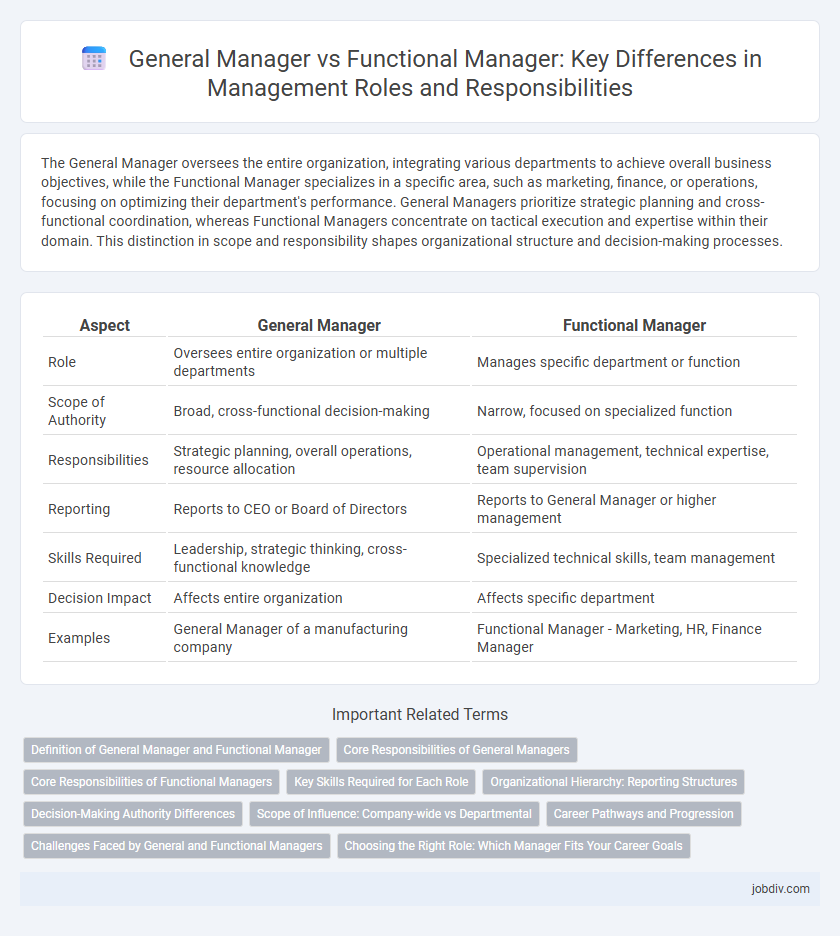The General Manager oversees the entire organization, integrating various departments to achieve overall business objectives, while the Functional Manager specializes in a specific area, such as marketing, finance, or operations, focusing on optimizing their department's performance. General Managers prioritize strategic planning and cross-functional coordination, whereas Functional Managers concentrate on tactical execution and expertise within their domain. This distinction in scope and responsibility shapes organizational structure and decision-making processes.
Table of Comparison
| Aspect | General Manager | Functional Manager |
|---|---|---|
| Role | Oversees entire organization or multiple departments | Manages specific department or function |
| Scope of Authority | Broad, cross-functional decision-making | Narrow, focused on specialized function |
| Responsibilities | Strategic planning, overall operations, resource allocation | Operational management, technical expertise, team supervision |
| Reporting | Reports to CEO or Board of Directors | Reports to General Manager or higher management |
| Skills Required | Leadership, strategic thinking, cross-functional knowledge | Specialized technical skills, team management |
| Decision Impact | Affects entire organization | Affects specific department |
| Examples | General Manager of a manufacturing company | Functional Manager - Marketing, HR, Finance Manager |
Definition of General Manager and Functional Manager
A General Manager oversees multiple departments and is responsible for overall organizational performance, strategic planning, and resource allocation. A Functional Manager specializes in managing a specific business function such as marketing, finance, or operations, focusing on tactical execution and functional team leadership. Both roles require leadership skills, but the General Manager operates at a broader executive level, while the Functional Manager maintains depth in a particular domain.
Core Responsibilities of General Managers
General Managers are responsible for overseeing the overall operations, strategic planning, and performance of an entire organization or business unit, ensuring alignment with corporate goals. They coordinate multiple departments, manage budgets, and drive growth initiatives to maximize profitability and market share. Unlike Functional Managers who focus on specific areas like marketing or finance, General Managers hold a broader scope, balancing cross-functional leadership and organizational development.
Core Responsibilities of Functional Managers
Functional managers oversee specific departments such as marketing, finance, or human resources, ensuring that their teams meet operational goals and maintain productivity. They are responsible for managing day-to-day activities, coordinating resources, and implementing policies within their area of expertise. Their core responsibilities include staff supervision, budget control, performance evaluation, and aligning departmental objectives with organizational strategy.
Key Skills Required for Each Role
A General Manager requires strong strategic thinking, leadership, and cross-functional coordination skills to oversee overall business operations and drive company-wide goals. A Functional Manager needs deep expertise in their specific department, excellent technical knowledge, and the ability to manage specialized teams for optimal performance within their function. Both roles demand effective communication, problem-solving abilities, and decision-making skills tailored to their respective scopes of responsibility.
Organizational Hierarchy: Reporting Structures
General Managers oversee multiple departments and report directly to top executives, establishing a broad organizational hierarchy. Functional Managers specialize in specific areas such as marketing or finance and typically report to General Managers within their domain. This reporting structure ensures clear accountability and efficient decision-making across different management levels.
Decision-Making Authority Differences
General Managers possess broad decision-making authority over multiple departments, enabling them to set strategic goals and allocate resources across the entire organization. Functional Managers have specialized decision-making power focused on their specific area of expertise, such as marketing or finance, ensuring operational efficiency within their department. The distinction lies in the scope and impact of decisions, with General Managers driving company-wide initiatives and Functional Managers optimizing departmental performance.
Scope of Influence: Company-wide vs Departmental
The General Manager holds a company-wide scope of influence, overseeing multiple departments and aligning diverse teams towards organizational goals. In contrast, the Functional Manager has a more focused scope, managing specific departmental functions and ensuring operational efficiency within that area. This distinction in scope directly impacts decision-making authority, strategic planning, and resource allocation across the business.
Career Pathways and Progression
Career pathways for General Managers typically involve broad leadership roles overseeing multiple departments or entire organizations, while Functional Managers specialize in advancing within specific operational areas like marketing, finance, or human resources. Progression to a General Manager position often requires developing cross-functional expertise, strategic decision-making skills, and experience managing diverse teams. Functional Managers may advance by deepening technical knowledge and leadership capacity within their domain, which can eventually lead to divisional or senior management roles.
Challenges Faced by General and Functional Managers
General Managers face challenges in overseeing multiple departments and aligning diverse functions with overall corporate strategy, often managing resource allocation and cross-functional communication. Functional Managers encounter difficulties in maintaining deep expertise within their specific area while meeting performance targets and adapting to changing technology or regulations. Both roles require balancing strategic objectives with operational demands, but General Managers must navigate broader organizational complexities compared to the specialized focus of Functional Managers.
Choosing the Right Role: Which Manager Fits Your Career Goals
Choosing between a General Manager and a Functional Manager depends on your career aspirations for scope and specialization. A General Manager oversees multiple departments and drives overall business strategy, suitable for those aiming for broad leadership roles. Conversely, a Functional Manager focuses on expertise within a specific area, ideal for professionals seeking depth and influence in a particular function.
General Manager vs Functional Manager Infographic

 jobdiv.com
jobdiv.com